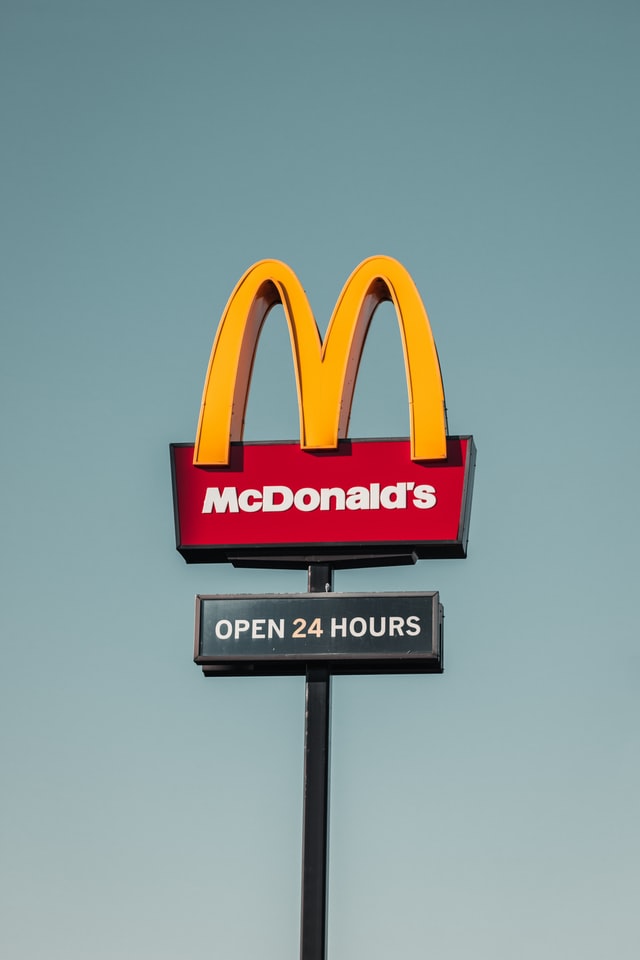
Mcdonald’s are stepping in to stop World War Three. Since when have corporations been political organisations?
Article by David Currey
Photo by Alex Motoc on Unsplash
As Russia invades Ukraine, the western world is left helpless and unsure how to respond to the tragic situation. As global leaders fumble around trying to sanction Russian oligarchs, corporations such as Mcdonald’s and Starbucks close their Russian branches in a bid to put pressure on President Putin to withdraw troops. Corporations haven’t always had this sort of political power and political stunts such as this bring up important questions about the dominant economic institution of our time. How have corporations got to such a position of power and is it really a good idea?
In a world where Walmart has higher revenue than the GDP of all but the top 24 world economies, it is easy to forget that corporations haven’t always been the way they are. Law changes in the US and UK at the end of the 19th century allowed for 1,800 corporations to be absorbed into 157 between 1898 and 1905, this was the start of their domination. Public discontent with how corporations threaten tradition somewhat controlled their growth at the start of the 20th century. In response, a form of new capitalism emerged in which corporations attempted to rebrand themselves to come across as more personable and trustworthy. In 1973 there was an oil market crash which led to a new wave of neo-liberal politics in the form of the Thatcher and Regan administrations. This coincided with an improvement in transport and communications technology and an international corporation boom followed. They were released from the shackles of the state allowing for unprecedented growth (Bakan, 2004). Although still functioning as economic institutions the wealth generated quickly translated to political power (Wilks, 2013).
It is crucial to understand the push and pull between governments, society and corporations throughout history to see how they got to such positions of power and how they haven’t always been this way. For example, in 1720 the South Sea company fraudulently sold shares in their knowingly unprofitable business resulting in stock prices shooting up and people losing lots of money. This was quickly clamped down on by the British government which put legislation in place making it illegal to create a company presuming to be a corporate body (Bakan, 2004). Contrast this with the situation we face today where corporations have broken laws and as a result contributed to climate change, for example, yet don’t receive as much as a smack on the wrist. In the last 300 years, corporations have accumulated such great power that they can not only inhibit the government’s ability to control them but also have political power on their own.
This is fundamentally problematic, institutions with so much political power should not be able to run without any form of accountability. Corporate accountability can be defined as the ability to sanction failure. Currently, there are no arrangements in place which grant any form of institution the power to do so efficiently and the only power that an average member of society has is the ability to strategically consume in an attempt to shift the market (Valor, 2005). Even this is becoming contestable as the prices of independent businesses go up and people have little choice but to spend their money on corporations to get by. If a government in a democratic country were to make a decision that was unpopular with the masses then they could lose their place in Office. But, if corporations make such decisions who is there to keep them in line?
Although it appears that Mcdonald’s decision to shut its branches in Russia appears to be one with good intent, it is impossible to say that this is how corporations will act on all issues. If they were to react to a global issue at the cost of the masses there would be little that governments could do as many rely on them for state approval (Valor, 2005). I don’t think we should trust these institutions with our future, instead, we should break them down to allow governments to re-establish their sovereignty. This would mean that decisions about issues such as climate change can be made without the influence of corporate interest and by a body which can be held accountable for failures. Radical policy such as this could be problematic though because the corporation isn’t bound to the state so can up sticks and move if political decisions upset them. This could result in lost jobs and economic damage, therefore, a global response is necessary. We must look back to when the British government clamped down on the corporation in response to the South Sea company scandal and think about how as a global community we can regain our grip on these institutions whose power is spiralling out of control.
Bibliography
Bakan, J. (2004). In The Corporation: The Pathological Pursuit of Profit and Power. New York: Free Press
Valor, C (2005). Corporate Social Responsibility and Corporate Citizenship: Towards
Corporate Accountability, Blackwell publishing
Wilks, S. (2013). The political power of a business corporation. Edward Elgar publishing https://www.theguardian.com/business/2022/mar/10/putin-war-mcdonalds-russia-i-remember
https://www.theguardian.com/world/2022/mar/08/mcdonalds-bows-to-pressure-and-closes-al l-its-russian-restaurants

0 Comments